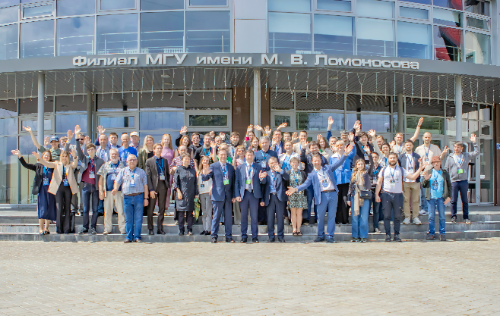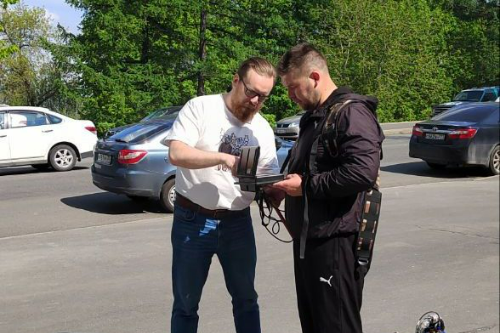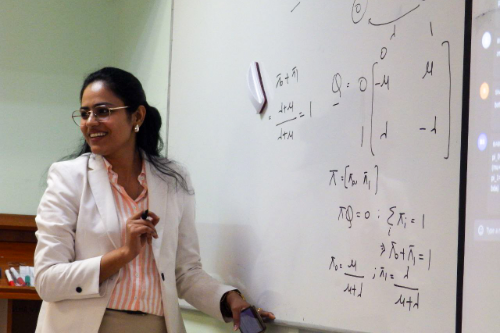A multidisciplinary field team of scientists from KarRC RAS surveyed three small rivers flowing to Lake Onego: Pukhta, Orzega, and Chyoba. The team included specialists in hydrobiology, silviculture, botany, and soil science. Sergey Sin’kevich and Denis Efremov from KarRC RAS told more about this effort.
The field studies were part of the international project WAMBAF Tool Box ("Water Management in Baltic Forests Tool Box"), where one of the tasks is to accommodate the European technique for small river assessment (Blue Targeting) to the realities of Northwest Russia. Russian partners in the project are KarRC RAS and WWF Russia. The Lead Partner is the Swedish Forest Agency.
The Blue Targeting tool box consists of over 30 questions to be answered during a field survey, permitting the value of the stream to be assessed and decisions to be taken on the actions needed to conserve it. In addition to filling out the field form (checklist), the scientists recorded factual data on the state and diversity of the terrestrial and aquatic environments.
The scientists remarked that the ban on clear-cutting in 50-m buffer strips along watercourses in Russia often vastly exceeds the European requirements. This reduces the risk of water pollution and helps conserve the diverse aquatic organisms. On the other hand, for many, often intermittent, creeks and springs there are no requirements for waterside protection strips. These unmapped watercourses often happen to flow through timber felling sites.
An important component of the data collected through the field surveys is the updated information about the riparian forest cover. Evidence has been gathered than the intensive logging without retention of waterside buffers early in the 20th century resulted in terrain-altering soil erosion.
Another essential output is information about the fish fauna of small rivers. Alongside the few “spawning” rivers, they provide an ecological niche for some valuable commercial and red-listed fish species: salmon, brown trout, grayling, whose life cycle includes breeding in rivers and 2-3 years that the young spend growing in the river until migrating to the lake or sea.
The project continues. The nearest plans include processing of the collected information, discussion of the results with Russian and foreign project partners, and preparation of proposals for customizing the tool kit for Karelian conditions.
The project initiators supposed that in the future forest users can themselves apply the customized tools to determine the value of typical northern small streams and knowledgeably take actions to conserve them in situations not regulated by existing legislation.
The project is implemented under the Interreg Baltic Sea Region 2014-2020 Programme and financed by the European Regional Development Fund with co-financing from the Russian Federation.
International
News

October 22, 2020
Specialists from the Karelian Research Centre RAS evaluated the state of several small rivers flowing to Lake Onego – Europe’s second largest lake
See also:

September 19, 2025
Researchers from BRICS+ countries network to study human-altered ecosystems
Studies of human-altered ecosystems were the key theme of the international webinar organized by the Karelian Research Centre RAS for scientists from Russia, India, China, and Belarus. Researchers shared expertise on the application of modern approaches and the results of their work, and agreed to create an expert network for further interactions.
Studies of human-altered ecosystems were the key theme of the international webinar organized by the Karelian Research Centre RAS for scientists from Russia, India, China, and Belarus. Researchers shared expertise on the application of modern approaches and the results of their work, and agreed to create an expert network for further interactions.

July 10, 2025
International School “Interaction of Hydrogen Isotopes with Structural Materials” was held at the National Center for Physics and Mathematics in Sarov, Novgorod Region. Karelian scientists gave a lecture and presentations on computational materials science – an efficient tool for rescaling test-sample experimental data to real-life power reactor structures.

June 6, 2025
Study trip to KarRC RAS helps specialist from Vitebsk master new electrical resistivity imaging techniques, with applications in construction
Cooperation of Karelian Research Center RAS with Vitebsk State University continues. On June 5, the University's Master's student Dmitry Lysov completed his practical training course. The construction industry specialist studied the geophysical methods used by researchers at KarRC RAS.
Cooperation of Karelian Research Center RAS with Vitebsk State University continues. On June 5, the University's Master's student Dmitry Lysov completed his practical training course. The construction industry specialist studied the geophysical methods used by researchers at KarRC RAS.

June 5, 2025
Scientists from India and Russia lecture on mathematical modeling of communication systems at IAMR KarRC RAS
Institute of Applied Mathematical Research KarRC RAS is hosting a set of lectures of stochastic modeling of telecommunication systems. Scholars from the Indian Institute of Technology Delhi (IIT-Delhi) are appearing before young scientists from Russia and India as invited professors.
Institute of Applied Mathematical Research KarRC RAS is hosting a set of lectures of stochastic modeling of telecommunication systems. Scholars from the Indian Institute of Technology Delhi (IIT-Delhi) are appearing before young scientists from Russia and India as invited professors.


